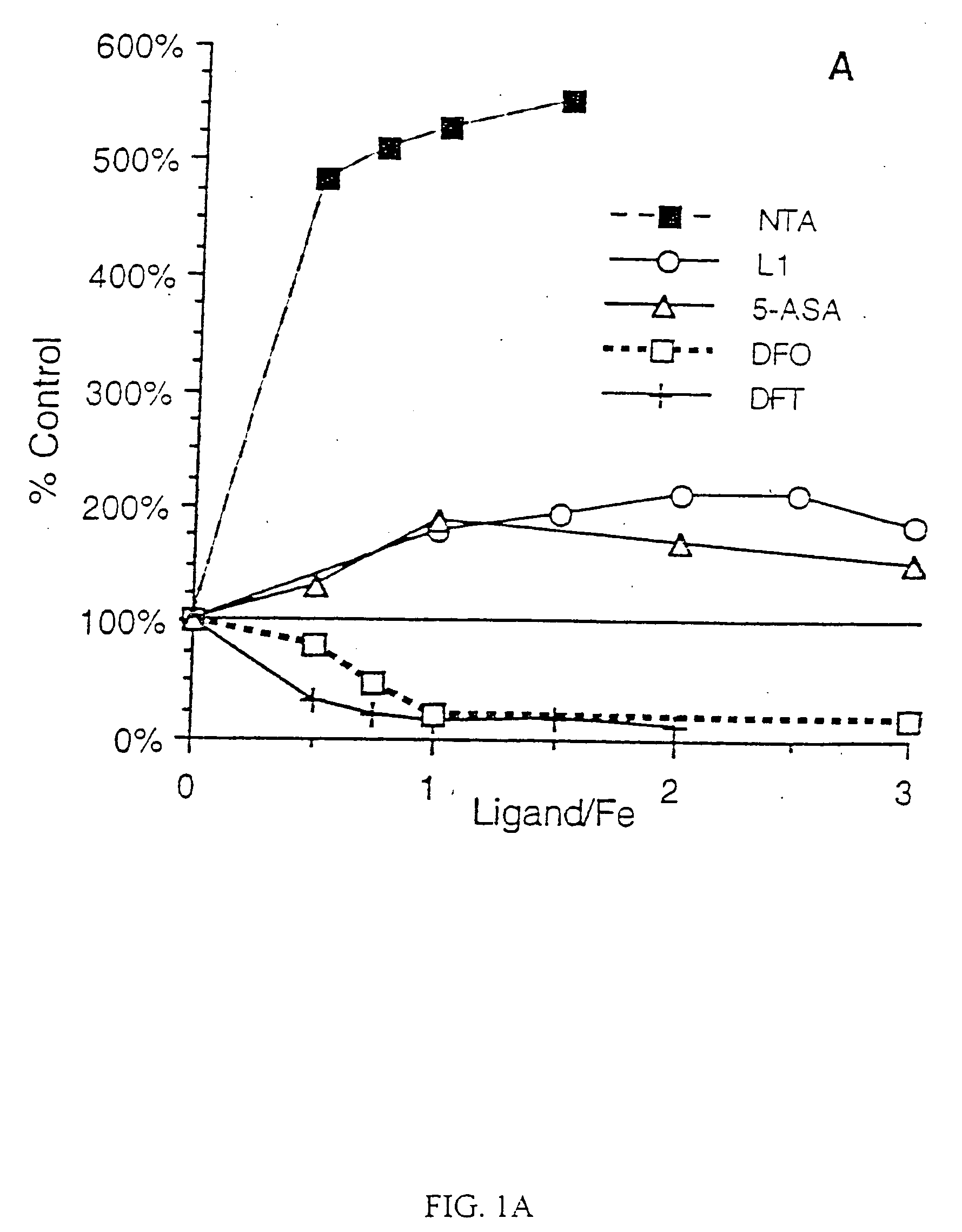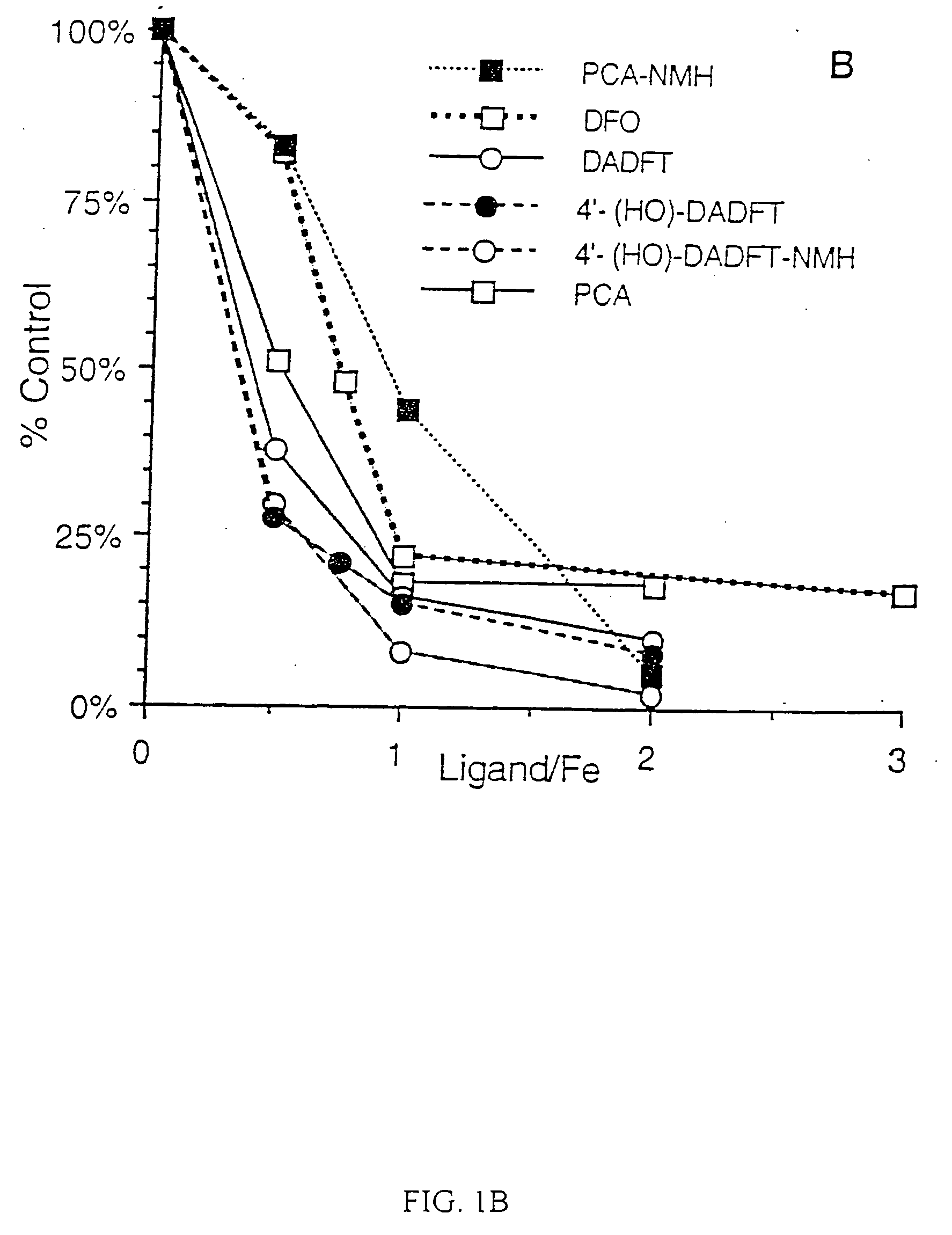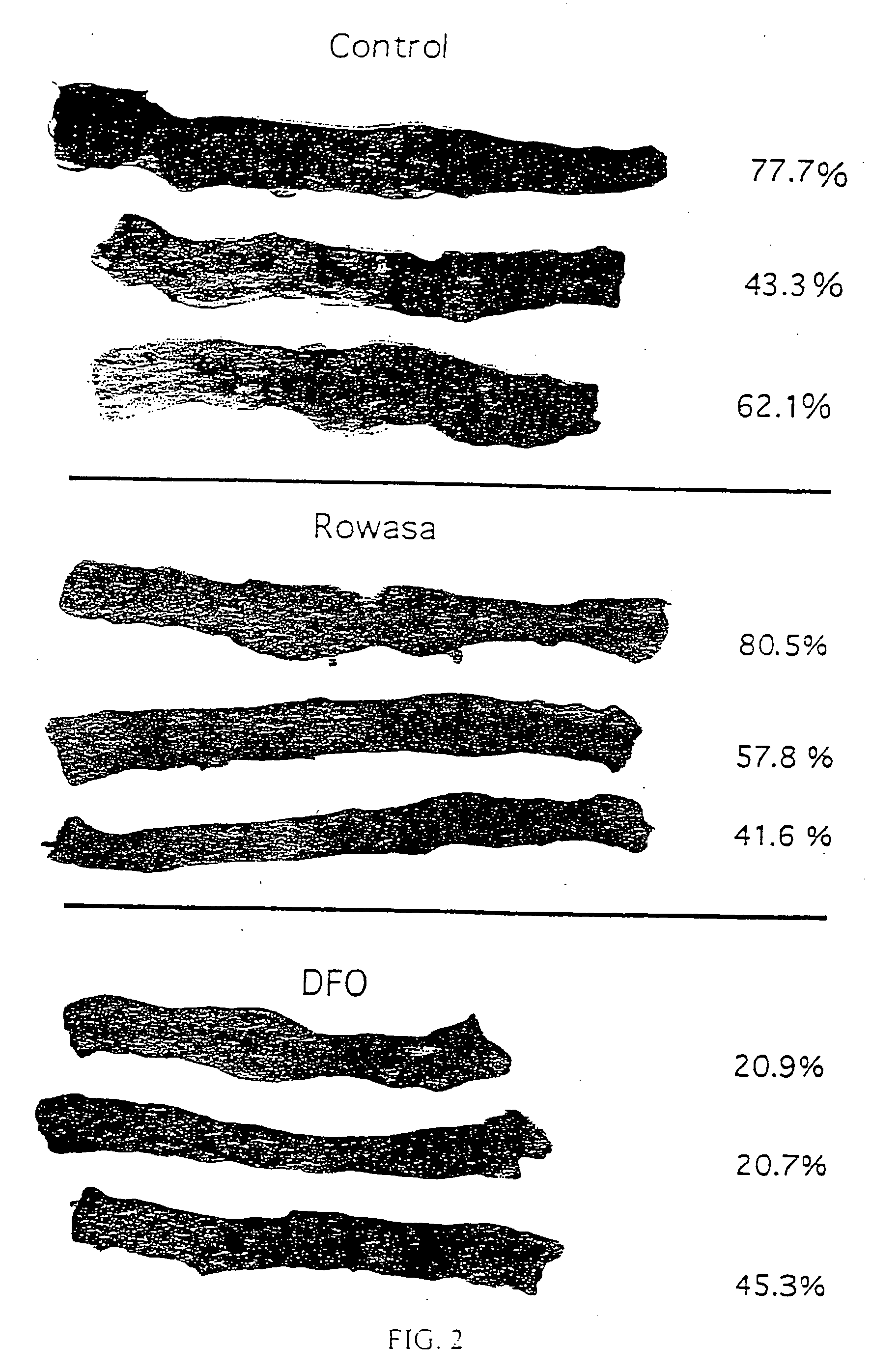Antioxidant and radical scavenging activity of synthetic analogs of desferrithiocin
a technology of desferrithiocin and synthetic analogs, which is applied in the field of antioxidant and radical scavenging activity of synthetic analogs of desferrithiocin, can solve the problems of ros, nadph oxidase, and other pathways leading to free radical formation, so as to prevent or inhibit free radical-mediated damage to cells, improve metal chelation and antioxidant properties
- Summary
- Abstract
- Description
- Claims
- Application Information
AI Technical Summary
Benefits of technology
Problems solved by technology
Method used
Image
Examples
example 1
Prevention of Iron-Mediated Oxidation of Ascorbate.
[0068] The iron chelators were tested for their ability to diminish the iron-mediated oxidation of ascorbate by the method of Dean and Nicholson (Free Radical Res. 20, 83-101 (1994)). Briefly, a solution of freshly prepared ascorbate (100 μM) in sodium phosphate buffer (5 mM, pH 7.4) was incubated in the presence of FeCl3 (30 μM) and chelator (ligand / Fe ratios varied from 0-3) for 40 min. The A265 was read at 10 and 40 min; the ΔA265 in the presence of ligand was compared to that in its absence.
[0069] Desferrioxamine B in the form of the methanesulfonate salt, Desferal (Novartis Pharma AG, Basel, Switzerland), was obtained from a hospital pharmacy. 1,2-Dimethyl-3-hydroxypyridin-4-one (L1) was a generous gift from Dr. H. H. Peter (Ciba-Geigy, Basel).
[0070] Spectrophotometric readings (Δλ) for the ascorbate and radical cation assays were taken on a Perkin-Elmer Lambda 3B spectrophotometer (Norwalk, Conn.).
[0071] The role of chela...
example 2
Quenching of the ABTS Radical Cation
[0075] The iron chelators were tested for their ability to quench the radical cation formed from 2,2′-azinobis(3-ethylbenzothiazoline-6-sulfonic acid) (ABTS) by the method of Re et al. in Free Radic. Biol. Med. 26, 1231-1237 (1999). Briefly, a stock solution of ABTS radical cation was generated by mixing ABTS (10 mM, 2.10 mL) with K2S2O8 (8.17 mM, 0.90 mL) in H2O and allowing the solution of deep blue-green ABTS radical cation was diluted in sufficient sodium phosphate (10 mM, pH 7.4) to give an A734 of about 0.900. Test compounds were added to a final concentration ranging from 1.25 to 15 μM, and the decrease in A734 was read after 1, 2, 4 and 6 min. The reaction was largely complete by 1 min, but the data presented are based on a 6-min reaction time.
[0076] In this assay, a fairly stable radical cation, ABTS+, was examined, and Trolox, an analog of vitamin E, was used as a positive control. Briefly, the procedure involved generating the blue-g...
example 3
Rodent Model of Acid-Induced Colitis and Inflammatory Bowel Disease (IBD)
Drug Preparation and Administration.
[0078] The ligands were administered to the rats intracolonically as a suspension or solution in distilled water (2 mL) at a dose of 650 μmol kg−1. The drug solutions were made fresh for each experiment. ROWASA®, the pharmaceutical preparation which contains 5-ASA (2 mL, 66.7 mg mL−1) was given at a dose of 2318 μmol kg−1. Control rats received distilled water (2 mL), administered intracolonically.
Induction of Colitis.
[0079] Animal care and experimental procedures were approved by the Institutional Animal Care and Use Committee. Colitis was induced by a modification of published methods. Briefly, the rats were anesthetized with sodium pentobarbital, 55 mg kg−1 intraperitoneally. The abdomen was shaved and prepared for surgery. A midline incision was made, and the cecum and proximal colon were exteriorized. A reversible suture was placed at the junction of the cecum and...
PUM
| Property | Measurement | Unit |
|---|---|---|
| pH | aaaaa | aaaaa |
| pH | aaaaa | aaaaa |
| temperature | aaaaa | aaaaa |
Abstract
Description
Claims
Application Information
 Login to View More
Login to View More - R&D
- Intellectual Property
- Life Sciences
- Materials
- Tech Scout
- Unparalleled Data Quality
- Higher Quality Content
- 60% Fewer Hallucinations
Browse by: Latest US Patents, China's latest patents, Technical Efficacy Thesaurus, Application Domain, Technology Topic, Popular Technical Reports.
© 2025 PatSnap. All rights reserved.Legal|Privacy policy|Modern Slavery Act Transparency Statement|Sitemap|About US| Contact US: help@patsnap.com



